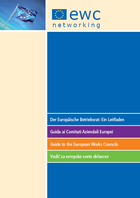

The establishment of a EWC requires dedication and perseverance. The conclusion of a Pan-European company arrangement ("EWC agreement") is a prerequisite. The first step towards this, is the establishment of the Special Negotiating Body (SNB), which is responsible for negotiating all the details of the EWC agreement with the European group headquarters ("central management").
These negotiations must be finalized within a period of three years, starting from the request for the establishment of the SNB. Works councils should have prepared a common strategy beforehand to avoid putting themselves under unnecessary time pressure. Travel and translation expenses for establishing initial contacts with employee representatives in other countries are to be borne by the employer. This has been confirmed by several German labour court rulings in the past. All expenses incurred following the establishment of the SNB are always to be borne by the central management.
Safeguarding a democratic election process
To put the work of the European works council on a legally sound footing, the greatest attention must be paid to the election of representatives. This not only applies to the recurrent European works council elections, but also begins before EWC establishment. All SNB members must be given their mandate on a democratic basis. The following two problem cases illustrate what continues to happen over and over again:
The European Metalworkers' Federation (EMF) has put together a review summarizing the rules for the election of representatives in all EU Member States. → Overview of national laws regarding the election
What are the legal consequences of an incorrect composition of a SNB? This fundamental question was already subject to legal action in Germany. → Further informationen
Rules of procedure reduce legal risk
Not only European works councils, but also Special Negotiating Bodies may adopt their own internal rules of procedure. It is particularly important to document the correct procedures for decision making, e.g. for taking legal action. The rules of procedure for the SNB of Takeda, the Japanese pharmaceuticals group can serve as a model. It is available from us on request.
Some employers want to restrict EWC rights
Once the request for the establishment of the SNB has been filed correctly, the employer can no longer avoid the formation of a European works council. The different employer and employee perspectives then confront each another during the negotiations. An interesting article in the Frankfurter Allgemeine business newspaper highlights the different positions that central management may take. The subtitle ("legal provisions can be limited through negotiations") already indicates how a EWC agreement may be concluded below legal minimum standards. → Recent example from France
Failed negotiations
The period allowed for negotiations is limited to three years and begins on the day that two countries file a written request. The SNB has to be convened within six months. If central management delays convening the SNB or does not come to an agreement within three years, then the negotiations fail. In this case, the EU Directive's subsidiary requirements apply automatically, i.e. a "default" EWC is to be established. Recent examples: → Lincoln Electric → Groupon → Magna International
EWC Seminar at Montabaur Castle
From 22 to 25 April 2025 the annual introductory seminar for members (including future members) of European works councils, SE works councils and special negotiating bodies will be held in Montabaur. Several seminar modules are offered for both beginners as well as advanced participants.
The castle is located on the high-speed rail-link half-way between Frankfurt and Cologne
and can easily be reached from Frankfurt International Airport in 30 minutes by train.
Our support as experts includes:
An example of our work

German and French employee representatives from Takeda, the largest pharmaceuticals group in Japan, had initiated the procedure to set up a European works council. Following training given to the German works council in July 2008 in Aachen, French and German employee representatives met in September 2008 in Paris to prepare for the establishment of their SNB with our assistance. In the constitutional meeting held in January 2009 in London, the SNB members finally commissioned Dr Werner Altmeyer as the expert. The negotiations were successfully concluded in May 2011. → Interview with the SNB chairman
More recent examples:
Manual on EWC establishment in four languages

This short manual on
the establishment of European works councils was published in four languages as part of the "EWC Networking" project sponsored by the EU. It is available from us free of charge, on request.
Info sheets by the European Trade Union Confederation (ETUC)
The ETUC has published the following information sheets as part of their campaign "On the offensive for stronger European works councils":
Video: What is a European works council?

This video lasting three and a half minutes describes characteristics and the role of a EWC. The video is only available in English, but subtitled in French, Italian, Spanish, German and Polish. The language can be chosen using the "settings" button.
Legal texts for download
Examples of recently established European Works Councils (national law in brackets):